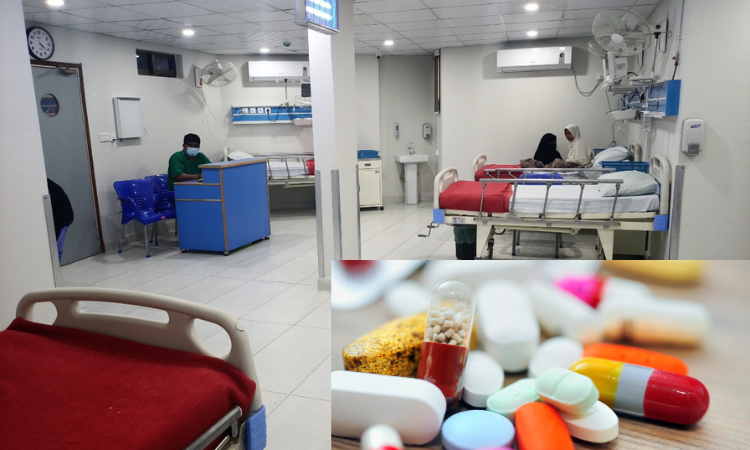Jinnah Postgraduate Medical Centre (JPMC) in Karachi is currently suffering from an acute shortage of essential medications, resulting in disrupted treatment schedules and compromised patient outcomes. Critical drugs, including antibiotics, insulin, chemotherapy agents, anaesthetics, and emergency medications, are in dangerously low supply across multiple major departments.
Scope and Scale of the Shortage
- Affected Departments:
Patients in the Endocrinology, Oncology, Intensive Care, Surgical, and Emergency units report unavailability of core medicines, forcing treatment delays or cancellations. - Patient Stories:
Individuals on chemotherapy had to reschedule crucial drug cycles. Diabetic patients are rationing insulin, and surgical teams are postponing operations due to lack of anaesthetics. - Drug List in Shortage:
The short supply includes broad-spectrum antibiotics (such as ceftriaxone), key insulin types, chemotherapy drugs (including cisplatin), anaesthetics (propofol, ketamine), and emergency respiratory and cardiac drugs.
Causes Behind the Crisis
- Supply Chain Breakdown:
Delays from national drug procurers and import restrictions have disrupted normal supply channels, reducing distribution to public hospitals like JPMC. - Budget Shortfalls:
Insufficient drug procurement allocations have slowed reorders and failed to address stock-outs quickly. - Rising Patient Numbers:
Increased out-patient visits and inpatient admissions have amplified drug consumption beyond usual reserves.
Consequences for Patient Care
- Delayed Medical Procedures:
Surgeries, chemotherapy cycles, and emergency interventions are being postponed, increasing morbidity risk. - Health Complications:
Uncontrolled infections, blood sugar spikes, and treatment complications have risen as patients are forced to wait for medication. - Public Outcry & Distress:
Families are distressed and fearful for loved ones, urging immediate action while public trust in healthcare provision erodes.
Immediate Response & Remedial Measures
- Alternative Sourcing:
Hospital administration is seeking interim supplies through private pharmacies whereas longer-term agreements with suppliers are under negotiation. - Redistribution of Stock:
Available medication is being reallocated from less-critical wards to priority patients in ICU, oncology, and emergency departments. - Emergency Procurement:
JPMC is expediting procurement plans with federal health authorities and pharma companies to restore baseline inventory levels.
Preventive Strategies & Future Preparednes
| Strategy | Action |
|---|---|
| Strengthened Procurement | Adequate budget allocation and proactive ordering cycles |
| Transparent Inventory System | Digital tracking of drug availability and automated alerts |
| Supply Chain Diversification | Engage multiple suppliers and local manufacturers |
| Patient Impact Monitoring | Track care delays and patient outcomes for rapid response |
| Regular Audits | Quarterly stock audits to prevent stockouts |
What This Means for Karachi’s Healthcare
JPMC’s crisis underscores vulnerabilities in public hospital pharmaceutical readiness. It highlights the need for robust procurement strategies, tech-driven inventory control, and government support to safeguard patient care. Without swift action, lives and trust in the public health system will continue to suffer.



Comments (0)
No comments yet. Be the first to comment!
Leave a Comment